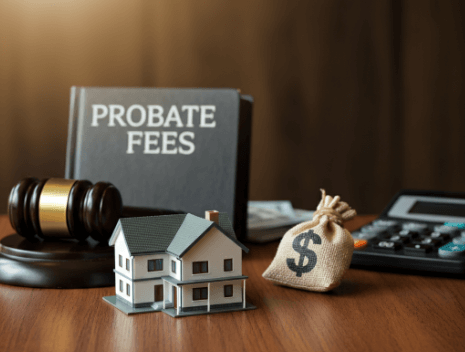Figuring out the cost of probate in Florida can be a confusing process. Many people worry about the financial burden, with average probate attorney fees in the state often ranging from $3,500 to $7,000 or more, depending on the estate’s complexity. This leads many heirs to ask, Do you have to pay probate fees upfront in Florida? Fortunately, the answer is usually no, as these costs are typically paid from the estate’s assets before distribution. For those seeking to avoid these complexities and costs entirely, selling the inherited property for cash is a straightforward solution. Steve Daria and Joleigh, real estate investors and cash buyers, help you sell your property quickly and easily. They frequently cover probate-related costs, simplifying the entire process for you. This guide will clarify your options and answer the question: Do you have to pay probate fees upfront in Florida? Book a free, no-obligation discussion with our team today to learn how you can settle your estate and get cash in hand without the wait.
Key Points
- Fees Are Paid from the Estate’s Assets: In nearly all Florida probate cases, fees and court costs are paid directly from the deceased person’s estate. This means you generally do not have to use your own money to cover these expenses.
- The Personal Representative Manages Payments: The court-appointed personal representative must pay all valid debts and administrative costs, including attorney fees. These payments are made before any assets are distributed to the heirs.
- You Can Sell Property to Cover Costs: If the estate lacks sufficient funds to cover probate fees, the personal representative can sell assets, such as a house. This allows the estate to generate the necessary funds without requiring heirs to pay upfront.
- Attorney Fees Can Be Negotiated: Florida law establishes guidelines for “reasonable” attorney fees, but these fees can often be negotiated. The final amount is typically paid at the conclusion of the probate process from the estate’s funds.
- Cash Buyers Can Simplify the Process: Selling inherited property for cash offers a quick way to get funds for the estate. This quick solution helps cover all probate costs and simplifies the entire process for you and your family.
What is probate in Florida?
In Florida, probate is the legal process carried out after a person’s passing to resolve their final affairs and distribute their assets.
This process includes validating the will, settling any debts, and giving the remaining assets to the heirs.
A court appoints a personal representative, often referred to as an executor, to oversee these tasks and manage the estate.

This person is responsible for inventorying the deceased’s property, paying bills, and ensuring that everything is handled in accordance with state law.
The process can sometimes be lengthy and involves various expenses, such as court filing fees and attorney costs.
This often leads people to ask, “Do you have to pay probate fees upfront in Florida?” Generally, these costs are paid from the estate’s assets, not from the heirs’ own pockets.
The main goal of probate is to legally transfer the deceased’s property to their beneficiaries and settle their financial affairs.
This guarantees the settlement of all outstanding debts and the subsequent distribution of residual assets to the designated beneficiaries.
Get An Offer Today, Sell In A Matter Of Days
What are the typical costs associated with the probate process in Florida?
The probate process in Florida involves several typical costs that you should be aware of.
These expenses may encompass court filing fees, the cost of publishing legal notices for creditors, and appraisal fees required to assess the property’s value.
Additionally, you may have to pay for a surety bond for the personal representative and fees for their service.
Attorney’s fees are often the most significant expense, usually calculated as a percentage of the estate’s total value.
The varying costs leave many people questioning, “Do you have to pay probate fees upfront in Florida?” Thankfully, these expenses are almost always paid directly from the estate’s assets, not out of your own pocket.
The personal representative manages these payments before any inheritance is distributed to the heirs.
Understanding these costs helps demystify the probate process and clarifies how the estate’s finances are settled in accordance with Florida law.
What happens if an estate in Florida doesn’t have enough money to pay probate fees?
- Assets are Sold to Generate Cash: The personal representative is authorized to sell estate assets, like real estate, vehicles, or valuable collections. The money raised from the sale is then used to pay all court costs, attorney fees, and other administrative expenses.
- The Property is Sold to a Cash Buyer: A quick way to get funds is by selling the estate’s property to a cash home buyer. This avoids the long process of a traditional sale and provides immediate money to settle all probate-related debts.
- The Personal Representative Can Be Reimbursed: In rare cases, a personal representative or heir may choose to pay the fees upfront to prevent a specific asset from being sold. They can then be legally reimbursed from the estate once assets are eventually liquidated.
- Creditors May Not be Fully Paid: If an estate is insolvent—meaning its debts outweigh its assets—creditors are paid according to a specific order established by Florida law. Some lower-priority creditors may only receive partial payment or no payment at all.
- Heirs May Receive Less Inheritance: Since all fees and debts must be settled before assets are distributed, the inheritance for the beneficiaries will be reduced. Once all costs are covered, any remaining assets are passed on to the heirs.
Are there alternatives to formal probate in Florida to reduce costs?
Yes, Florida offers several alternatives to formal probate that can help reduce costs and save time.
The most common alternative is Summary Administration, a simplified and faster process available for estates valued at less than $75,000 or when the deceased has been deceased for more than two years.
Another option is a “Disposition Without Administration,” which applies to very small estates to reimburse funeral or medical expenses.
Additionally, assets in a living trust or with named beneficiaries can bypass probate.
These options can significantly lower the financial burden, but many people still ask, “Do you have to pay probate fees upfront in Florida?” Even with these alternatives, some costs may arise, but they are typically paid from the estate’s assets.
By planning ahead with tools like trusts and beneficiary designations, you can avoid the formal probate process.
This ensures a smoother transfer of assets to your heirs without the high costs and delays associated with a full probate proceeding.
Is it better to pay probate fees from the estate or sell the property to a cash buyer in Florida?
- Speed and Convenience: They offer a significantly quicker process compared to waiting for an estate to settle or listing your property with a realtor. This quick injection of funds allows you to pay off all probate fees and debts promptly, often within a few weeks.
- No Upfront Repair Costs: Cash buyers purchase properties “as-is,” meaning you don’t incur any expenses on costly repairs or renovations. Paying fees from the estate might require you to maintain and fix the property until it can be sold or transferred.
- Certainty of Sale: A cash offer provides certainty in a process filled with unknowns, as there’s no risk of buyer financing falling through. Relying on the estate’s funds is only possible if there is enough cash available to cover all expenses.
- Simplified Process: A cash sale consolidates the biggest asset into liquid funds, making it easier for the personal representative to pay debts. This avoids the complexity of managing a property and dealing with potential disputes among heirs.
- Maximizing Inheritance: While a cash offer may be slightly less than market value, it saves you from paying realtor commissions, closing costs, and holding expenses. Paying from the estate is straightforward, but it may deplete the cash reserves intended for the beneficiaries.

What documents do I need to sell an inherited property to a cash buyer?
To sell an inherited property smoothly and legally to a cash buyer, you’ll need specific documents.
The most important document is the “Letters of Administration,” which is the court order officially appointing you as the personal representative of the estate.
You will also need a copy of the death certificate and, should one exist, the original will.
A signed purchase agreement, meticulously detailing the terms of the sale, is a prerequisite for both the buyer and the title company.
This process often raises financial questions, such as, “Do you have to pay probate fees upfront in Florida?” Cash buyers can provide the funds needed to cover these costs without using your own money.
The title company will also require identification and will assist in preparing the final closing statements and deed for transfer.
Expert real estate investors, such as Steve Daria and Joleigh, can guide you through this paperwork.
Contact our team today for a hassle-free cash offer and expert guidance on selling your inherited property.
**NOTICE: Please note that the content presented in this post is intended solely for informational and educational purposes. It should not be construed as legal or financial advice or relied upon as a replacement for consultation with a qualified attorney or CPA. For specific guidance on legal or financial matters, readers are encouraged to seek professional assistance from an attorney, CPA, or other appropriate professional regarding the subject matter.

